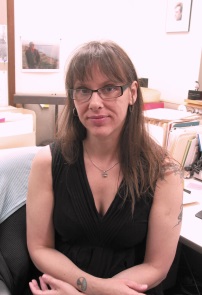- About Archives
- About SAA
- Careers
- Education
- Publications
- Advocacy
- Membership
Vice-Char/Chair-Elect
 Gina Rappaport
Gina Rappaport
Head Archivist/PhotoArchivist
National Anthropological Archives
Smithsonian Institution
Bio: Gina Rappaport is the head archivist and archivist for photograph collections at the Smithsonian Institution’s National Anthropological Archives (NAA), a position she has held since 2009. In this position she is responsible for all aspects of the management of the NAA’s photograph collections, as well as general oversight of NAA operations and outreach. Before joining the Smithsonian, Gina was a project archivist at the National Oceanic and Atmospheric Administration’s Pribilof Project Office where she co-authored The Pribilof Islands, a Guide to Photographs and Illustrations, a publication on historical visual resources relating to Pribilof Islands History. Prior to this Gina established the Photograph Archives for Lassen Volcanic National Park through a joint project between the University of Washington Libraries Special Collections and the National Park Service. She is a member of Northwest Archivists (NWA), Mid-Atlantic Regional Archives Conference (MARAC), the Society for American Archivists (SAA), and the American Anthropological Association (AAA). She currently serves on SAA’s Native American Archives Roundtable (NAAR) steering committee. Gina received her MA in History, Archives, and Records Management from Western Washington University.
Statement: As an archivist at one of the Nation’s largest repositories of materials relating to indigenous communities I depend on NAAR and similar groups to provide guidance and support to our staff on the proper and respectful care of our holdings. My vision for NAAR is a well-established forum for discussion and engagement on topics relating to the management of Native American archival materials. For tribal archivists and archivists whose responsibilities include archives relating to indigenous communities, NAAR is an effective venue to address mutual concerns, meet and share experiences, explore opportunities for collaboration, and take a major role in bringing awareness of issues relating to the respectful care of indigenous archives to the greater archival community. With this in mind I would like to see NAAR continue its annual meeting practice of inviting speakers to talk on relevant projects and programs, as well as assist in organizing appropriate sessions for the conference program. In the short term, the 2014 SAA/NAGARA meeting in Washington DC presents a number of opportunities for NAAR to engage with affiliated colleagues across numerous institutions, through hosting an event such as a symposium or reception. Through these annual meetings, sessions, and events at SAA NAAR can strengthen its membership and usefulness throughout the year to all archivists who care for Native American archives.
Steering Committee (Two Openings)
 Colleen Cook
Colleen Cook
Archives Coordinator
Aqua Caliente Band of Cahuilla Indian
Palm Springs, California
Bio: I am the Archives Coordinator for the Agua Caliente Band of Cahuilla Indians Tribal Historic Preservation Office. In this role I maintain the Cultural Register of sacred and historic properties for the tribe, cultural reference materials, and the general working documents of the office. I received my MLIS from San Jose State and have worked in a variety of archives and libraries since. I am also a member of the Society of California Archivists and American Library Association. I am also on the Host Committee for the 2014 meeting of the Association of Tribal Libraries, Archives, and Museums.
Statement: My vision of NAAR is to be a national advocate for tribal archives and records both to non-native and native agencies. Native American archives present unique challenges of access, collaboration, and ownership that need a strong voice to advocate for and educate about these issues to both native and non-native communities. To this goal, I would like NAAR to reach out and collaborate with other Native American groups, outside of the record community (such as the National Association of THPOS, Association on American Indian Affairs, Inter-Tribal Councils, etc.), to establish trainings, guidelines, and materials to assist tribes in the establishment, management, and training of an archives and staff (specifically for tribes without a current program).
 Michael Pahn
Michael Pahn
Interim Head Archivist/Media Archivist
National Museum of the American Indian Archive Center
Smithsonian Institution
Bio: Michael Pahn is the Media Archivist at the Smithsonian Institution’s National Museum of the American Indian, a role he has filled since 2003. In this capacity he is responsible for acquisition, description, access, and preservation of historic motion picture films, video, and audio recordings at the NMAI Archive Center. Michael has overseen preservation projects funded by the National Film Preservation Foundation, Save America’s Treasures, and the Smithsonian Collections Care and Preservation Fund. Since 2012 Michael has served as NMAI’s Interim Head Archivist. His prior experiences include Save Our Sounds Project Librarian at the Smithsonian Center for Folklife and Cultural Heritage, and Librarian at The Nature Conservancy. Michael has a BA in Anthropology from the University of Pittsburgh and an MLS from the University of Maryland.
Statement: My vision for the future of NAAR is to further use our roundtable as an opportunity to learn about and from each other. Records and collections of and about Native Americans, and Indigenous people from all over the world, can be found in so many different repositories that it can be staggering. Many of these repositories have widely divergent missions, scopes, and policies. I see NAAR as a great venue for starting to understand the diversity of these institutions, large and small. I would like to take advantage of SAA's 2014 Annual Meeting in Washington, DC to bring together archivists from many different Federal Institutions such as the Library of Congress, Smithsonian museums, the National Archives and Records Administration, and the Park Service to discuss how these repositories differ from each other, and ways in which they are similar. We could have similar discussions with tribal archives and museums, university archives, historical societies, and other institutions, in order to better understand how to we can share information, standards, and best practices.